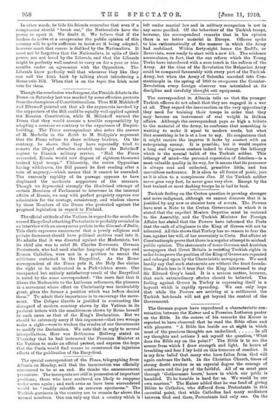The official attitude of the - Vatican in regard to the
much-dis- cussed Encyclical attacking Protestants is probably revealed in an interview with an anonymous prelate in the Giornale cr Italia. This cleric expresses amazement that a purely religious and private document should have political motives read into it. He admits that it was directed against the Modernists, but its chief aim was to extol St. Charles Borromeo. German Protestants, who had used similar language of the Pope and Roman Catholics, were not in a position to resent the criticisms contained in the Encyclical. As the Rome correspondent of the Times puts it, the Holy See claims the right to be understood in a Pickwickian sense. One unexpected but entirely satisfactory result of the Encyclical is noted by the same correspondent : "the mere fact that it likens the Modernists to the Lutheran reformers, the pioneers in a movement whose effect on Christianity was incalculably great, gives the former a position which was before denied them." To admit their importance is to encourage the move- ment. The Cologne Gazette is justified in contrasting the disregard of modern courtesy shown by the Vatican in its pastoral letters with the sensitiveness shown by Rome herself in such cases as that of the King's Declaration. But we should be extremely sorry if this argument—that two wrongs make a right—were to weaken the resolve of our Government to modify the Declaration. We note that in reply to several interpellations, Herr von Bethmann Hollweg stated on Thursday that he had instructed the Prussian Minister at the Vatican to make an official rotest, and express the hope that the Curia would find means to counteract the injurious effects of the publication of the Encyclical.














































 Previous page
Previous page